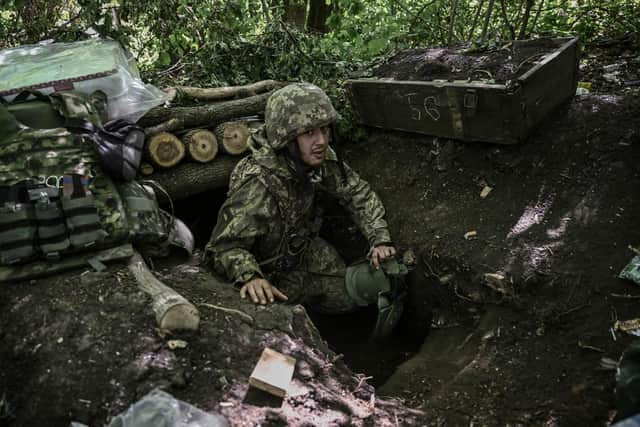Ukraine's ability to hold back Russian invaders hangs in balance - Patrick Mercer
The facts of what’s happening in the Donbas cannot be ignored: even the Telegraph’s highly respected, veteran defence editor, Con Coughlin, has recently written about a ‘‘shock triumph’’ for Russia.
But only those who’ve been mesmerised by hope over reality will be surprised by the brutal inevitability of the last month.
Advertisement
Hide AdAdvertisement
Hide AdNow, Russia failed humiliatingly in the first few weeks of the war around Kiev.


But this blinded us to the success of their blitzkrieg along the coasts of the Azov and Black Sea in the south which, in a few days, cut a 280-mile swathe through Ukraine and linked the all-important Crimea with Donetsk in the east and Kherson in the west. With the exception of Mariupol – which took weeks to subdue – this was a remarkable operation, a proper study of which would have prepared us for what’s now happening in Donbas.
Similarly, an understanding of this operation should have removed any surprises from the tactics which the Russians are using to bludgeon their way through the Ukrainian Regular Army’s carefully prepared defensive positions in the east. For eight years these gun pits, redoubts and strong points have been made ready for exactly the sort of grinding battle that is taking place at the moment. Moscow’s troops may not be romping forward, but advancing they are, drenching trenches in shrapnel before gradually encircling the defenders then killing or capturing them.
We must now ignore the hubris of the armchair generals and self-appointed experts and listen to Ukraine’s President.
Advertisement
Hide AdAdvertisement
Hide AdHe says about around 100 troops are being killed and 500 wounded every day: that’s a full strength battalion every 24 hours. But, he also says his army’s about 600,000 strong and so you’d think losses like these – ghastly though they are – could be absorbed for a limited period.
Think about it, though. The point of an army’s spear is slender and needle sharp while the shaft is long and blunt: those 600 lads who perish every day come not from the rump of supporting clerks and logisticians, but the few, hardy fighters right at the tip. It’s hundreds of gunners, pilots, tank soldiers and infantrymen who are daily being torn and killed: that tip gets blunted very quickly.
Against pounding artillery and air support, Ukrainian reinforcements are being sent forward to counter-attack in places like Seiverodonetsk and Kharkiv with some success.
But, these men are largely territorial defence units, already from Kiev’s fifth wave of mobilisation, many of them over 40 years old, who might have expected tame duties along lines of communication, but never a wild, lethal storm like this. No wonder Mr Zelensky suggests that things are becoming ‘‘very difficult’’.
Advertisement
Hide AdAdvertisement
Hide AdTo counter this, Ukraine’s President hints that another great tranche of manpower – perhaps 500,000 – are being drilled, trained and equipped in readiness for a summer offensive which will throw Russia’s faltering forces out of his country entirely.
Now, that resonates with Britain’s efforts to rebuild her forces after Dunkirk, but there’s scant evidence that this army even exists. Such numbers would soon be identified by satellites and there would even be advantages in showing them off to the media – but there’s very little sign of anything like it.
The other side of the coin, of course, is that Russia is bleeding too. Moscow’s lost thousands of vehicles, ships and aircraft while casualties (no matter whose estimate you believe) have been appalling, but she has yet to mobilise.
That’s the whole reason for the Kremlin’s insisting that this is a ‘‘special military operation’’ rather than a war: the campaign’s still being fought by a relatively modest number (about 200,000) of troops from Russia’s peacetime army.
Advertisement
Hide AdAdvertisement
Hide AdThere has yet to be a national call-up although, even if that were to happen, it would take months to rebuild and significantly expand the forces.
Meanwhile, Ukraine’s got to get the long range weapons she’s been supplied by the West to the front.
That looks simple enough on media bulletins, but transporting heavy kit from the Polish border via a damaged rail network and across the Dneiper bridges whilst being hit by guided missiles and aircraft was never going to be easy.
It’s a miracle that anything at all gets through.
This leaves both sides in a race against time, I believe. First, Russia knows that her combat power is dwindling, but if she can seize the Donbas in its entirety before the summer ends and the rains start, then a form of face-saving ‘‘victory’’ might be declared. Despite the allure of another crack at Kiev or a push at Odessa, I think that her troops will then, like a punch drunk boxer, have to slump back in their corner, panting for a rest.
Advertisement
Hide AdAdvertisement
Hide AdSuch a pause would be fatal for Ukraine, though. If Moscow’s bruiser is given time to recover, he’ll come back fresh and ready to stake his claim. No, the West does Ukraine and itself no favours by false optimism: with almost a quarter of his country under the Kremlin’s control, President Zelensky’s warnings must be taken seriously and the weapons and expertise he needs despatched with speed and political courage.
While President Putin will suggest that Nato and the West is neither swift nor brave and cite last year’s debacle in Afghanistan as proof, he knows that the situation is dangerous and finely balanced.
That balance can only be tipped in Ukraine’s favour, though, by bold, steely leadership from the West and a determination not to let our alliances fragment: the next few weeks will crucial.
- Patrick Mercer is a former MP for Newark and Army colonel.
